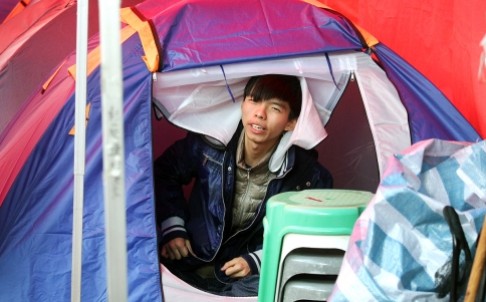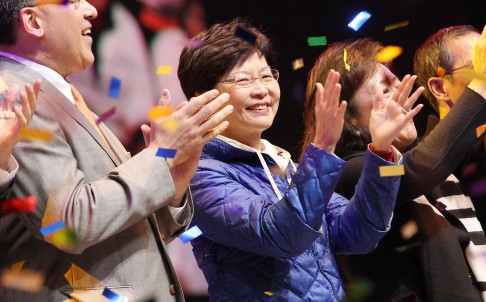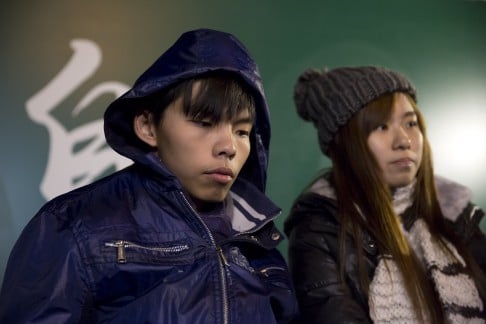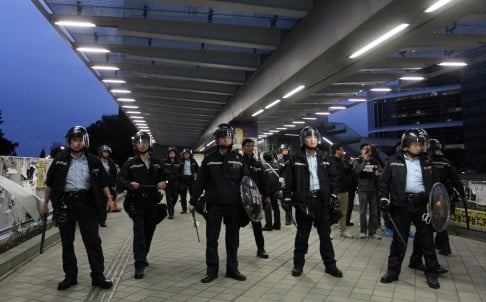
Occupy Central
Occupy Central is a civil disobedience movement which began in Hong Kong on September 28, 2014. It calls on thousands of protesters to block roads and paralyse Hong Kong's financial district if the Beijing and Hong Kong governments do not agree to implement universal suffrage for the chief executive election in 2017 and the Legislative Council elections in 2020 according to "international standards." The movement was initiated by Benny Tai Yiu-ting (戴耀廷), an associate professor of law at the University of Hong Kong, in January 2013.

Umbrella Movement
The Umbrella Movement (Chinese: 雨傘運動; pinyin: yǔsǎn yùndòng[1]) is a loose political movement that was created spontaneously during the Hong Kong protests of 2014.[2] Its name derives from the recognition of the umbrella as a symbol of defiance and resistance against the Hong Kong government, and the united grass-roots objection to the decision of the Standing Committee of the National People's Congress (NPCSC) of 31 August.
The movement consists of individuals numbering in the tens of thousands who participated in the protests that began on 28 September 2014, although Scholarism, the Hong Kong Federation of Students, Occupy Central with Love and Peace, groups are principally driving the demands for the rescission of the NPCSC decision.
The movement consists of individuals numbering in the tens of thousands who participated in the protests that began on 28 September 2014, although Scholarism, the Hong Kong Federation of Students, Occupy Central with Love and Peace, groups are principally driving the demands for the rescission of the NPCSC decision.
OCCUPY CENTRAL - DAY 70: Full coverage of the day’s events
Hong Kong student activist Joshua Wong gives up on hunger strike after five days
PUBLISHED : Saturday, 06 December, 2014, 4:07pm

Hong Kong student activist Joshua Wong stopped his hunger strike at noon today over health concerns, but may return and consider resuming the fast to press for universal suffrage.
Wong had not eaten food, subsisting on water and energy drinks, for 110 hours. He had joined several other student leaders on hunger strike on December 2.
"After more urging from medical staff and seeing [Wong] being extremely weak to the point of breaking, he has ceased his fast," said Derek Lam Shun-hin at a Scholarism press conference held at 3.30pm.
The other remaining three strikers are continuing the action but are physically weak, Lam said.
The news comes just after Hong Kong Chief Executive Leung Chun-ying rejected calls to hold a dialogue with the students, qualifying that though he was open to talks, the pro-democracy leaders should play by Beijing's rules.
Wong has been one of the main faces of the Occupy civil disobedience movement which began in September and drew thousands to the streets in the first few days, igniting clashes with police.
WATCH: When Hong Kong student leader Joshua Wong began his hunger strike
The movement, which has been "leaderless", built up encampments in Admiralty, Causeway Bay and Mong Kok for several weeks, withstanding mob attacks and police pressure for more than two months.
Days into the strike, Wong's sugar levels had dropped to 2.7, requiring him to be given a spoonful of glucose. His last sugar level record was 4.1 taken this morning, according to doctor Chan Shuk-ying, who is part of the team monitoring the hunger strikers' health.
His heartbeat had also been dangerously fast, with the highest recorded at 108 - the normal level being not more than 100, said Chan.
Lam, of Scholarism, said Joshua Wong had returned home to rest and clean up and may take some liquid sustenance, but will return to the Occupy site for the 8pm rally. Whether more members will join the strike, or whether Wong will rejoin, will be announced during the evening rally.
Meanwhile, a fourth, Isabella Lo Yin-wai, among the first group who started the hunger strike on Monday night, quit on Friday on doctor’s orders.
Dr Wong Yam-hong, spokesperson of the medical team for Occupy, said he had been most worried by Lo's condition.
He said Lo’s heartbeat had been quite fast and she had low fever on Thursday night. “If she goes on, it is possible that her body would experience permanent damage. We strongly ordered her to resume eating gradually later tonight.”
Lo said she felt ashamed for the decision to cease fasting. She said she was born with a condition that caused irregular heartbeats. “But I will not give up striking for democracy. I will still come back to fight with everyone," she said.
"This is not about whether we have faith that the government would [hold a] dialogue with us, but about hope. CY [Leung] always said that the doors of dialogue are wide open, yet we've tried so many different ways to reach out only to be denied dialogue. So this is another attempt to open communication with the government," Scholarism's Lam said.
Of the remaining three hunger strikers, Prince Wong has been fasting for over 113 hours, while Gloria Cheng Yik-lam and Eddie Ng Man-hin have been fasting for over 75 hours. All of them have only been drinking water.
With additional reporting from Chris Lau
Joshua Wong ends hunger strike; 2017 consultation will happen 'soon after Occupy ends'
After student leader gives up his hunger strike, democracy debate poised to move from streets with second round of 2017 election discussion
PUBLISHED : Saturday, 06 December, 2014, 4:07pm

The debate over the 2017 chief executive election looked to be moving from the streets to the political arena yesterday, as government officials pledged to start a second round of consultation "soon after Occupy ends".
Chief Secretary Carrie Lam Cheng Yuet-ngor said that when the consultation begins, "I'll be very willing to meet student representatives and listen to them".
The comments came as student leader Joshua Wong Chi-fung ended a 108-hour hunger strike. The officials ruled out dialogue with Wong, saying talks were possible only within the framework of the Basic Law and Beijing's guidance on 2017.
The new consultation is the final stage before the government puts a reform plan to the Legislative Council, probably in the summer, moving a showdown with pan-democrat lawmakers closer.
Wong and two fellow members of Scholarism gave up their hunger strikes, which started on Monday, yesterday. Another quit on Friday. Lam called on two others who had not eaten since Wednesday to give up.
Constitutional affairs minister Raymond Tam Chi-yuen said the government "would not entertain" requests for talks made through coercive means such as hunger strikes.
The new consultation will cover the details of the 2017 poll after the National People's Congress Standing Committee laid down a framework in August for how "two or three" candidates will be chosen for a public vote.
Tam said the consultation, to start "soon after" Occupy ended, would focus on topics including how hopefuls could enter the "primary election" in which a 1,200-strong committee will choose candidates. It will also look at how public opinion can be "formally channelled" and how to make the committee transparent and accountable.
Civic Party leader Alan Leong Kah-kit and Democrat Albert Ho Chun-yan said pan-democrats would stand by their vow to veto any reform based on Beijing's framework. Pan-democrats say the committee will "screen out" critics of Beijing. The reform needs a two-thirds majority in Legco, meaning pan-democrats have the votes to block it.
WATCH: When Hong Kong student leader Joshua Wong began his hunger strike
Returning to Admiralty last night, Wong criticised officials for ignoring the hunger strike, noting that fellow striker Prince Wong Ji-yuet was taken to hospital yesterday. He said that two years ago when members of his group went on hunger strike against national education, Chief Executive Leung Chun-ying and Lam visited on the second day.
"Now we have someone being admitted to the hospital, will the officials put aside their conscience? I am really looking forward to it," he told a rally.
Speculation continued last night on how long the Admiralty camp would remain. A clearance is thought to be unlikely until after President Xi Jinping visits Macau on December 19.
Lester Shum, of the Federation of Students, told the rally the group's actions "would not cease with the occupation".
This article appeared in the South China Morning Post print edition as Consultation 'soon after Occupy ends'
Cash pours in as 'millions' donated to police over Occupy
Internal as well as public support for officers dealing with Occupy protests expressed in cash, with panel to decide how to spend it
Police stand guard as they face a crowd of pro-democracy protesters in Tamar. Photo: May Tse
An outpouring of support for the police - driven by their front-line and often controversial role in the Occupy Central protests - has seen close to HK$10 million donated to support officers in the past month.
Officially, the force remains tight-lipped about the amount raised both internally and externally. But according to informed sources, cash donated by serving officers since a special fund was set up in October, added to the amount raised through a public fundraising drive that ends today, brings the total amount donated close to eight figures.
The fund was set up by two unions to support officers whose livelihoods were affected by the Occupy Central protests.
However, it is unclear how the cash will be spent, as relatively few officers have suffered directly as a result of the protests.
There have been suggestions the funds could be used to help the seven officers who have been arrested for allegedly beating Civic Party activist Ken Tsang Kin-chiu in October.
According to one police source, "several million" was donated by serving officers in a special internal fundraising effort that ended on November 20. A total of HK$1 million alone was donated by officers from the criminal investigation department, the source said.
A further HK$4 million to HK$5 million was raised from the public through a separate fundraiser that ends today, said another source from the Junior Police Officers Association.
"So far, we have received no inquiries or requests for help from anyone," said the source, adding that officers of all ranks were eligible to make donations or request aid. A six-member committee - half from the Junior Police Officers Association and the rest from the Police Inspectors' Association - would assess the needs of those who applied before allocating funds, the source said. "The fund will be used mainly for providing financial assistance to the injured or suspended officers and their families," the source said.
But another source said the fund might be extended to other purposes.
Officers may receive as little as half of their salaries when suspended.
"We've made it clear from the outset that the fund will not be used to subsidise the legal fees of any officer involved in court cases," the second source said.
Seven police officers, including two inspectors, were caught on video allegedly beating Civic Party member Tsang in a back alley during an Occupy protest.
The seven, dubbed "devil cops" by protesters, were suspended and arrested late last month.
A designated bank account had been set up for the internal fundraising, the sources said, while donations from the public would be transferred to the force's Police Welfare Fund.
This article appeared in the South China Morning Post print edition as Special police fund gets millions
Protesters must abandon fantasy of a 'Hong Kong race' free from the mainland
Regina Ip says the Occupy protesters who are in effect demanding self-rule - rather than democracy - have been misled by the years of colonial rule into rejecting their Chinese family

For months, warnings against Occupy Central sounded by Beijing officials were dismissed as "crying wolf" in some quarters. Protesters had likewise sent many warnings of a "final showdown", but few were able to predict the precise shape that the face-off would eventually take.
The violent clashes between demonstrators and the police last Monday, more than two months after Occupy began, finally put paid to any semblance of "love and peace" and prompted the three chief instigators of Occupy to turn themselves in to the authorities. As students vow to fight on, it will be a while before Occupy can be brought to a close.
As the endgame draws near, debates are under way on what caused Occupy to erupt in such a ferocious manner, causing damage to the economy, cleavages in family and society and a body blow to Hong Kong's reputation as a safe and law-abiding city.
A multitude of factors have been put forward as underlying causes. Among former senior officials, a view has emerged that Occupy was inevitable.
It was inevitable because the protest was not really about democracy. Large numbers were attracted, especially at the start of the protest, by the democracy mantra. But right from the start, the quest for self-rule was evident from slogans - such as "self-determination" - writ large on the backdrop of the stage when students kicked off their sit-in.
In the past year, in several issues of Undergrad, the official publication of the University of Hong Kong students' union, contributors have advocated "self-determination" by "the Hong Kong race".
Occupy is an attempt to redefine "one country, two systems" and, by implication, Hong Kong's relationship with China. By rejecting the decision of the National People's Congress Standing Committee of August 31, which ensures Beijing's say on the outcome of the chief executive election in 2017 via the nominating committee, the Occupy demonstrators are effectively saying no to China's sovereignty over Hong Kong.
Since 1997, Beijing has been nothing but extraordinarily helpful to Hong Kong whenever the latter's economy is in trouble, and extraordinarily tolerant in allowing protests unimaginable on the mainland to thrive in Hong Kong. For a country of 1.3 billion people, which has never known universal suffrage in its 5,000 years of history, it is taking huge risks and a plunge into the unknown by promising Hong Kong ultimate election of the chief executive by universal suffrage. In 2007, it even went further in spelling out a timetable for universal suffrage to happen.
Under the "one country, two systems" arrangement, Hong Kong is also extraordinarily privileged in not having to pay tax to the central authorities or the costs of defence of the territory. (In the colonial era, Hong Kong paid as much as 70 per cent).
Why this rage against the motherland which has done nothing but tried its best to welcome back an "abducted" child with open arms?
Occupy was inevitable because Hong Kong had been a British colony for more than 150 years. Its population includes many who fled to this southern outpost to escape the turmoil that ravaged China during the death throes of the Qing empire and the chaos of the Republican era. It also includes many who fled here for fear of communism. Under British rule, Hong Kong people enjoyed unprecedented rights and freedom, the rule of law and a much higher standard of living. It was ruled as though it was part of the West. While many Chinese families remained steeped in traditional values, Western ideas and institutions exerted indelible influence.
In the last two decades of British rule, the sharp contrast with the much more conservative and regimented Chinese culture and systems was accentuated by the mad dash to usher in democracy and new legislation to strengthen the protection of rights and freedoms. The local officials set to lead the new administration were hardwired to "benchmark" the performance of Hong Kong under China against Western standards, and to defend its system against erosion by authoritarian China. The stage was set for "one country" to be viewed as a threat to "two systems".
The paranoia was aggravated by the tragedy of June 4, 1989, images of which were seared into the memory of Hong Kong people. Since then, annual rituals in remembrance of the lost souls have not helped engender forgiveness or a broader understanding of the context in which the tragic events occurred.
Perhaps the greatest blow to some Hong Kong people's perception of the motherland is the reversal of economic fortune and roles which have followed the economic ascendency of China. Now heavily dependent economically on mainland China, the sense of injured pride has led many to view China as a threat, and fantasise that Hong Kong would be better off as a free-standing "Hong Kong race".
Yet the reality is "Hong Kong race" has no place in the world and Hong Kong's destiny is intertwined with that of China. The sooner our leaders can help the young and the restless come to terms with that, the better. Hong Kong people must muster enough courage and wisdom to find a new place of pride in the family of 1.3 billion.
Regina Ip Lau Suk-yee is a legislator and chair of the New People's Party
This article appeared in the South China Morning Post print edition as One country, one people



沒有留言:
張貼留言